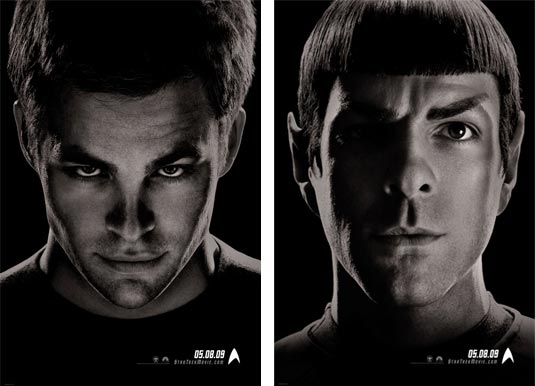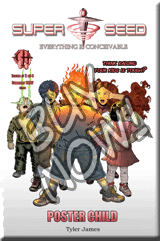
 Two big budget classic sci-fi reboots are battling it out for your box office buck this weekend. Terminator: Salvation will be the big winner in sales this Memorial Day, but Star Trek is continuing to do well, fueled by great word of mouth and strong reviews. I've seen them both, and am going to give you my take. In a head to head contest, it is no contest...Star Trek is a far superior film and a more enjoyable trip to the theaters.
Two big budget classic sci-fi reboots are battling it out for your box office buck this weekend. Terminator: Salvation will be the big winner in sales this Memorial Day, but Star Trek is continuing to do well, fueled by great word of mouth and strong reviews. I've seen them both, and am going to give you my take. In a head to head contest, it is no contest...Star Trek is a far superior film and a more enjoyable trip to the theaters.First a note: I wanted to love Terminator, and I'm not a Trekkie. I never really got into the old TV show, and while my step-father was a huge fan of that show and The Next Generation, it was always take it or leave it for me. And while I saw most of the Star Trek films, I was never all that blown away by them. But Terminator...I've always been a huge fan of the series. I first saw the original in an edited version, sneaking up past my bedtime watching on pay cable...which makes every movie better. And T2...what a flick! I've been saying for years that the two most influential movies of the 90's were Pulp Fiction and Terminator 2. Cameron's film set the bar for every special effects heavy blockbusters to come afterwards, and set it high.
Furthermore, Terminator 2 was the first R rated movie my step-father ever took me to. I was 12 at the time, and remember fondly lobbying my mother with a series of reasons why she should let me go see it. (I believe I had to promise to close my eyes at any overly violent parts and agree to watch two G-rated movies to counteract the "effects" of T2. Gotta love mom.) But anyway, my step-dad and I went to it and we both loved it. He passed away almost a decade ago now, and silly enough that trip to the theater is one of the fond memories of him I carry with me to this day. So, note to all you recent fathers...you never know which moments it will be that your kids are going to hang on to. Do your best to make them all special, got it?
Okay, now, the reviews. The running theme of this post is that Star Trek got it right and Terminator Salvation didn't. Here's how:
The Two Protagonists Problem
Storywise, Star Trek is a perfect example of "The Hero's Journey." It's the story of James T. Kirk, first and foremost. The story moves, in swift and entertaining fashion, from the tragic circumstances of Kirk's birth, to him as a fearless yet reckless child, to an underachieving young rabblerouser, to a man who fulfills his destiny to sit in the Captain's chair of the U.S.S. Enterprise. There's no question, not for one second, that this is Kirk's story. Sure, there are other main characters, all of the popular ones from the classic series are there. And yes, Spock gets a lot of screentime (we even spend time with him as a child) and he has a hero's journey of his own. But Spock's main purpose, as it has always been, is to serve as that cool headed, completely rational counterpoint to Kirk's passion and bravado. Star Trek doesn't have schizophrenia. JJ Abrams knows whose movie Star Trek is.
McG, I'm afraid, does not. One of screenwriting guru Robert McKee's rules of story: Have only one main protagonist. Terminator Salvation has two. And as a result, neither character lives up to his or her full potential. Any Terminator fan went into the theater expecting for the first time to watch the story of John Conner as an adult, leading the resistence in the post-Judgement Day future. With mega-star Christian Bale as the lead, he clearly had to be the protagonist, right? Well, not really. Bale splits screentime with Sam Worthington, who plays Marcus Wright, a deathrow prisoner who wakes up 15 years after he was executed to find himself alive in the wartorn apocolyptic future. And the problem is, Worthington's story is far more interesting than Bale's. Worthington's character actually arcs...Bale's not so much. John Conner simply isn't given that much to do, and as a result, Bale's performance is largely one note. But, because Terminator fans are so familiar and invested in the John Conner character, it's kind of head scratching to wonder why we're spending so much time watching this other guy. For you sci-fi writers, keep this in mind...Two protagonists = one problem.
Lighten It Up
Good drama contains successive moments of raising tension, and then releasing it. Wax and repeat. Fundamentally, comedy is the same way. You put characters in an impossible, humorous situation and then watch the trainwreck ensue and the punchline delivered. Tension raised, tension released. Star Trek was not a comedy by any stretch of the imagination. But it was funny. Great directors and writers understand that the higher the tension and higher the stakes at play in action movies, the greater the impact of a well-placed gag or joke. Your audience needs room to breathe a bit, and a chuckle inbetween one perilous scene of impending doom to another goes a long way. Go ahead. Name a great action movie. Any one. I'll bet somewhere amidst the explosions and the life-or-death stakes, there were some good one liners. And Star Trek delivered them. Simon Pegg practically stole the show as Scotty.
Terminator Salvation, on the other hand...There was not a single moment of levity in the entire flick. Not one! The movie made the mistake of taking itself too damn seriously. Sure, I get that it's a post apocolyptic future with most of humanity wiped out and killer super-machines trying to murder the few who are left. Not exactly vaudevillian stuff. But one of the themes the movie was struggling to get across is that there's a difference between man and machine. And, one of those great characteristics of humanity is our ability to laugh in the face of danger, and make light of even the most perilous situations. This movie left some funny on the table, and as a result, we were never drawn as fully into the characters' plights as we could have been if we just liked them a little more. And the strange thing is, the early Terminator flicks understood this. Arnold's deadpan lines and lack of understanding of human culture made for some funny comedic moments. And that contributed to a better film.
Antogonists are Important
Now, Eric Bana's portrayal of Nero, the main villain in Star Trek, is not going to win him any awards. But at least Star Trek had a main villain. There was a reason James Cameron had Arnold play the Terminator and waited until the very end of the first movie before he completely removed his skin and went all machine. Simple fact is, it's easier to root for (and against) humans than generic killer robots. In Arnold's Terminator, we had a classic villain...unstoppable, unemotional, unrelenting. But who is the main villain in the new one? Well, it's Skynet. It's a computer. Now, sure, there were some cool new Terminator machines in Salvation. There were killer airships and killer motorcycles and killer robot eels and killer giant robots. But, there's nothing behind it, no big main villain, and without a human face to hate, well, it leaves the audience yawning.
Look at The Matrix. The Wachoskis understood this. The enemy was the machines in that movie too, but they created Agent Smith too give us a cold hearted bastard to root against. Salvation could have used an Arnold (and not the weird CGI Arnold they pulled out at the end of the movie), a Robert Patrick, or (uggh) even a Kristanna Loken.
There's Making the Old New Again...
Star Trek has always worked because, at the very heart of it all, it's a story about the power of friendship. And that, my friends, is a timeless theme. Star Trek paid homage nicely to the original, with cameos and lines and such that longtime fans would remember. But it felt fresh, a testament to both the screenwriters and the director. (And a hot young cast didn't hurt, I suppose.)
...and Then There's the New That Seems Old
Unfortunately, Terminator Salvation, as a movie, has nothing new to say. There are no timeless themes present in this flick. It's largely a soul-less movie. And as a result, even their efforts to pay homage to earlier films fall flat. Yes, I did like the fact that a teenage Kyle Reese's first lines in the film were "Come with me if you want to live." In fact, Anton Yelkin the young actor who played Reese (and also, played a young Chekov in Star Trek) did a pretty great job of sounding like a young Michael Beihn. But Bale uttering Arnold's most famous line from the first two films later on in the film just seems kind of tired. And furthermore, the revelation of what Marcus Wright actually is just wasn't that interesting. (Especially to Battlestar Galactica fans. Clearly John Conner has never heard of a Cylon.)
In sum, Star Trek delivers, Terminator Salvation does not. See 'em both? Love to hear your take.











3 comments:
Very interesting writing. Really enjoyed the dual analysis.
That was a very good analysis of my same feelings after seeing both films.
I agree with the analysis of the films, but "antagonist" is written with "a", not "o". If you write "antogonist", you will have to write "ogony" instead of "agony".
Post a Comment